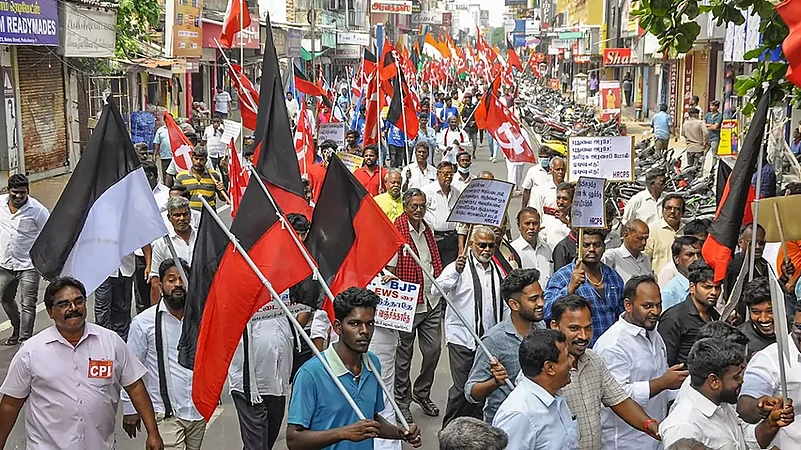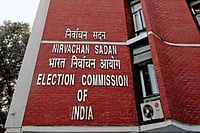The Chhattisgarh government's move to raise the reservation in government jobs and educational institutions to 76 per cent ahead of the next year's Assembly elections is “politically motivated” and would not survive in the court of law, say political and legal experts.
The Chhattisgarh High Court has already held twice that reservation beyond 50 per cent is impermissible, and re-promulgating the same policy is an eyewash, they claim. The state government's latest move has come ahead of the bypoll scheduled on Monday in Bhanupratappur Assembly segment, reserved for Scheduled Tribe candidates.
Two amendment bills related to quota in government jobs and admission in educational institutions in proportion to the population of different categories in the state were passed by the Chhattisgarh Assembly on Friday, taking the total extent of quota to 76 per cent.
According to the bills, the Scheduled Tribes will get a quota of 32 per cent, Other Backward Classes 27 per cent, Scheduled Castes 13 per cent and four per cent has been provisioned for the Economically Weaker Sections (EWS) in public employment and admissions in educational institutions.
The Assembly also passed a resolution urging the Centre to enlist these bills under the 9th Schedule of the Constitution.The opposition Bharatiya Janata Party (BJP) had claimed the state government did not make any effort for two months in this direction after the HC's decision and the bypoll to Bhanupratappur Assembly segment prompted the Bhupesh Baghel-led administration to convene the session to woo tribal voters.
Talking to PTI, former Indian Police Service (IPS) officer Akbar Ram Korram, who is contesting the Bhanupratappur bypoll as an independent candidate with the support of the Sarva Adivasi Samaj, claimed the state government introduced the amendment bills in a hurry for "political motives" without assessing its implications.
“When the state government failed to justify in court the 58 per cent reservation which was implemented in 2012, then how would it be able to defend the hike up to 76 per cent," he wondered. The decision will definitely be stayed by the?? court and ultimately every quota beneficiary will suffer, he claimed.
Former Indian Administrative Service (IAS) officer Sushil Trivedi said even after the governor gives assent to the bills, it would be tough to implement them as the Supreme Court has already put up a cap of 50 per cent on reservation for the Scheduled Castes, Scheduled Tribes and the Other Backward Classes.
Describing the state government's move as political and sentimental, Trivedi said the matter pertaining to reservation in Chhattisgarh is already pending in the apex court. Expressing similar views, high court lawyer Anish Tiwari said the Chhattisgarh HC has on two previous occasions (in October 2019 and September 2022) held that reservation beyond 50 per cent is impermissible.
"Re-promulgating the same policy is a fraud on powers of the constitutional court," claimed Tiwari, who was the counsel of a petitioner in the 2019 reservation case in the HC. “Even if the new policy finds a place in the 9th schedule of the Constitution, no purpose will be served as any law enlisted under this schedule after Keshavananda Bharti case (1973) is open to judicial review. Passing the same law again is merely an eyewash,” he claimed.
The issue of quota became a matter of concern for the ruling Congress when the Chhattisgarh High Court in September this year set aside the previous Raman Singh-headed BJP government's 2012 order to raise the quota to 58 per cent in government jobs and admissions in educational institutions, observing that reservation exceeding the 50 per cent ceiling was unconstitutional.
The decision halted the recruitment process for government jobs triggering a massive protest particularly by tribals whose quota came down to 20 per cent from 32 per cent following the order. The present Baghel government also faced criticism from the BJP, which accused it of failing to protect the constitutional rights of tribals.
The state government filed a special leave petition (SLP) against the High Court's decision in the Supreme Court on October 21 this year. A two-day special session of the state Assembly was convened on December 1 and 2 and the amendment bills related to quota were passed.
According to the Chhattisgarh government's 2012 amendment in reservation rules, the quota for the Scheduled Castes was slashed by four per cent to 12 per cent, while that for the Scheduled Tribes was increased by 12 per cent — from 20 per cent to 32 per cent. The reservation for the Other Backward Classes was kept unchanged at 14 per cent.
The Congress came to power in Chhattisgarh in 2018. Next year, it announced a hike in the reservation for OBCs to 27 per cent from 14 per cent and for the Scheduled Castes to 13 per cent from 12 per cent in public employment and admissions. Besides, a provision of 10 per cent reservation for the EWS was also approved, taking the total extent of reservation in the state then to 82 per cent.
However, in October 2019, the Chhattisgarh High Court stayed the Baghel government's decision and cited there are no quantifiable data of the concerned population available. Later, the state government constituted the Chhattisgarh Quantifiable Data Commission for a survey of the people belonging to the state's backward classes and economically weaker sections.
The commission recently submitted its recommendations to the Chhattisgarh government according to which the state has an OBC population of 42.41 per cent and 3.48 per cent of the Economically Weaker Sections.
(With PTI inputs)


























